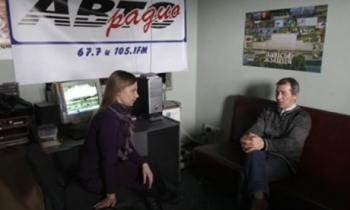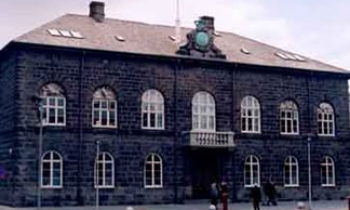Darfur is in the news finally. And all for the wrong reasons.
The genocide which remained out of the headlines primarily in the US media, is now generating more than 5,000 results on Google news following the arrest of an American Pulitzer-winning journalist on charges of spying.

US journalist Paul Salopek, Chicago Tribune correspondent, as well as his driver, Suleiman Abakar Moussa, and interpreter, Abdulraman Anu, have been held since August 6 on charges of spying and entering Sudan illegally. Moussa and Anu are Chadians. They are being held in Al-Fashir, capital of the western state of North Darfur.
During the early part of Darfur's 3-1/2-year-old conflict, Sudanese authorities denied foreign journalists permission to travel to the region and heavily censored the national press. Many reporters then crossed illegally through Chad to cover the fighting, which created what UN officials called the world's worst humanitarian crisis with 2.5 million having fled their homes to miserable camps. Authorities have improved procedures for journalists to travel to Darfur through Khartoum, but some who find it difficult to get Sudanese visas still decide to enter through Chad.
Chicago Tribune Editor and Senior Vice President Ann Marie Lipinski called Salopek "one of the most accomplished and admired journalists of our time. He is not a spy. Our fervent hope is that the authorities in Sudan will recognize his innocence and quickly allow Paul to return home to his wife, Linda, and to his colleagues." She added: "We are deeply worried about Paul and his well-being, and appeal to the government of Sudan to return him safely home."
In 1998 Salopek won the Pulitzer Prize for Explanatory Reporting for his coverage of the human genome diversity project; in 2001 he won a Pulitzer for International Reporting, recognizing his work in Africa, including his coverage of the civil war in Congo. Salopek, who has a degree in environmental biology from the University of California at Santa Barbara, was on the staff of National Geographic magazine from 1992 to 1995. In those years he contributed to a score of articles, including a bylined feature on mountain gorillas in the wake of Rwanda's civil war (October 1995).

"The Sudanese government is becoming increasingly embarrassed by what foreign journalists are reporting in Darfur, so arresting them as spies is a way to dissuade them from coming to cover the unacceptable human tragedy unfolding there," Reporters sans Frontières (RSF) said. "This is ridiculous and disgraceful. Salopek and his assistants are media workers who were acting in strict accordance with the rules of their profession. They should be freed at once."
"Salopek was on assignment for National Geographic magazine to write a comprehensive feature article on the swath of sub-Saharan Africa known as the Sahel," said National Geographic Magazine Editor-in-Chief Chris Johns. "He had no agenda other than to fairly and accurately report on the region. He is a world-recognised journalist of the highest standing, with a deep knowledge and respect for the continent of Africa and its people."
"We view the espionage accusation and other criminal charges made against Salopek and his colleagues as absurd and a violation of the most basic norms for freedom of the press. Paul Salopek is one of the world's most honored and highly respected foreign correspondents, and he was simply doing his job of reporting the news," Committee to Protect Journalists (CPJ) Executive Director Joel Simon said in a letter to Sudan President Omar Al Bashir.
Salopek was working on a report about the Sahel region for National Geographic magazine when he was arrested with his driver and interpreter on August 6. He was carrying two US passports, which is not unusual for journalists who cover war zones. He also had satellite photos that anyone can download from the Internet.
When he appeared in court in Al-Fashir on August 26, he was charged with spying and "disseminating illegal information" — crimes punishable by long prison terms under the Sudanese criminal code. He was also accused of entering Sudan without a visa. At the request of his lawyer, the presiding judge adjourned his trial until September 10.

An Al-Fashir court sentenced Slovenian writer, photographer and human rights activist Tomo Kriznar on August 14 to two years in prison and a fine of 500,000 dinars (approx. 1,820 euros) for spying, publishing false information and entering Sudan without a visa. His lawyer has appealed. Kriznar had recently been acting as a special adviser to his country's president.
During a hearing on August 1, Kriznar admitted to entering Sudan without a visa from Chad. He said he did this on the invitation of the Sudan Liberation Movement (SLM). But he denied the spying charge. His request for a visa was refused by the Sudanese embassy in Vienna because of his "negative" articles, the Sudanese foreign ministry said. He had written several articles about the situation in Darfur for Slovenian newspapers and his website http://www.tomokriznar.com .
Sudanese President Omar Al-Bashir undertook to promote democratisation, the rule of law and freedoms on July 11, 2005, when he announced the repeal of emergency laws in the presence of UN Secretary-General Kofi Annan, several African presidents, and many senior European and US officials.
Sudanese newsmen told Deutsche Presse Agentur (DPA) they were not surprised by the crackdown on foreign journalists in Darfur, and claimed that independent media in Sudan routinely faces restrictions. "Sudan is a dangerous place to be a journalist," said Alfred Taban who won the Speaker Abbot award in 2005 for his reporting on the Darfur conflict for BBC.
Taban, a southern Sudanese, founded the independent Khartoum Monitor, a newspaper which supports the ideals of black Christians who have long fought the northern Arab government based in Khartoum. During Sudan's twenty-one year north/south civil war, the Khartoum Monitor was often shut down for printing material deemed inappropriate by the Khartoum Islamist administration.

In January 2005, a Comprehensive Peace Agreement (CPA) ended the war and was intended to pave the way for a freer press in Sudan. Several independent newspapers have opened in Khartoum since the signing of the accord, but Editor-in-Chief of the Citizen Daily newspaper, Nhial Boll, says the threat of arrest and detention is routine for journalists in Sudan.
"People are dreaming that there is freedom of the press and freedom of information, but as a journalist I am not feeling that at all," Boll said. "The issue is access to information. If we don't have this, then what we are doing is not practical." Boll told DPA that one of his staff photographers was arrested this week and the film in his camera destroyed by security forces, after he took pictures of the flooded Nile River without first obtaining permission.
Since the signing of the May 5 Darfur Peace Agreement between the Sudanese government and one of the three main rebel groups, fighting has escalated between signatories and non-signatories to the peace deal. In recent weeks, as many as 50,000 people have been displaced across the region, while nine humanitarian aid workers were killed and 20 vehicles hijacked in July, according to the UN humanitarian news and information service Integrated Regional Information Networks (IRIN).
The Sudanese government has proposed its own protection plan, which involves deploying another 10,500 troops to "consolidate the security situation". "Displaced people in Darfur are terrified that the same soldiers who expelled them from their homes and villages may now be sent supposedly to protect them," Kate Gilmore, Amnesty International's Executive Deputy Secretary-General, said on Monday.
The United States and Britain introduced a draft resolution to the Council on August 17 that would give a UN force broad powers to protect civilians in Darfur. The proposal calls for a gradual transition from the underfunded African Union (AU) force in Darfur, which has been unable to prevent widespread abuses against civilians, to a UN protection force of 17,500, in addition to 3,300 civilian police. But President Al-Bashir has warned that Sudan's army would fight any UN forces sent to Darfur.

The international pressure over Darfur has led to a return to a tougher line towards the domestic press. Naser Eldien Ahmed Altayeb of the privately-owned, Arabic-language daily Al-Ayam, was arrested at 2 am on August 16 and badly beaten up by about 20 police officers using batons. He had just written about an incident in Dar-al-Salaam (30 km south Khartoum) in which refugees from Darfur and southern Sudan were evicted from the land they had been occupying for 20 years after it was sold to an Egyptian real estate developer. He is being treated in the Khartoum university hospital.
Four journalists working for privately-owned dailies — Mougahed Abdalla of Ray Alshab, Abdoulgasiem Farahna of Alowan, Moutaz Mahjoob of Al-Adwaa, and Mouheb Maher of Al-Sudani — were arrested on August 15 and held for nearly five hours by police in the northern town of Marawi when they tried to visit the victims of flooding that occurred on August 10. The police said they had received orders not to let journalists into the flood-hit area.









